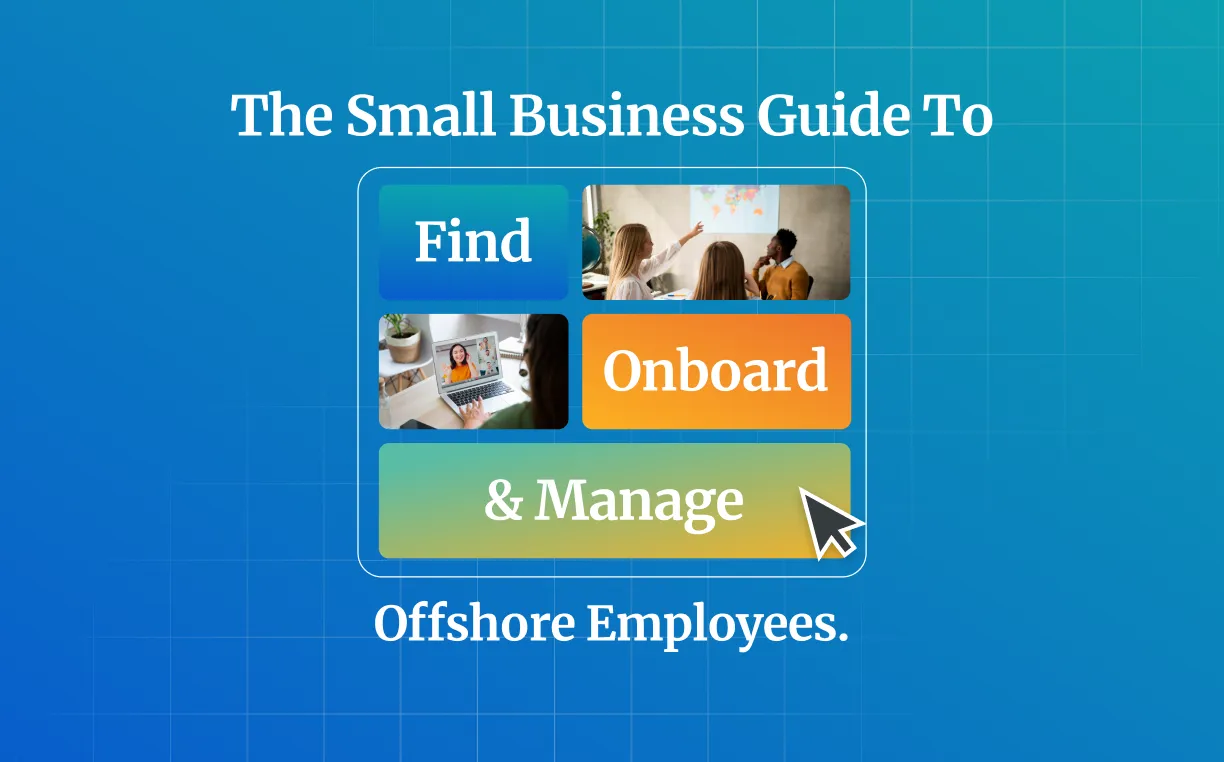Global Accounting Outsourcing in 2026: Why Businesses Are Hiring Accountants & Bookkeepers Offshore
Key Takeaways:
- The accounting talent shortage in the US continues to grow, with the workforce dropping by roughly 10 percent from 2019 to 2024, pushing companies to hire offshore accountants to fill skill gaps and maintain continuity.
- Cost savings remain one of the biggest drivers, with businesses reducing labor expenses by 50 to 70 percent when hiring offshore accountants and bookkeepers compared to local hires.
- Offshore locations like the Philippines provide deep talent pools, with over 200,000 CPAs trained in US and international standards, making global hiring faster, more scalable, and more affordable.
- Outsourcing is shifting from simple cost-cutting to strategic partnership, as offshore teams now support FP and A, financial analysis, virtual CFO work, and real-time reporting.
- Technology and automation are redefining outsourced accounting, with AI tools, cloud workflows, and integrated dashboards improving efficiency, accuracy, and turnaround times.
- Businesses can scale financial operations more easily with offshore teams, adjusting workloads during tax season, audits, or growth phases without the high cost of domestic hiring.
- Hybrid accounting models are becoming standard, pairing local accountants for regulatory and strategic work with offshore teams for high-volume tasks like bookkeeping, payroll, and reconciliation.
- The Philippines remains a preferred outsourcing destination, thanks to strong English proficiency, cultural alignment, cost arbitrage, and a growing BPO industry valued at about $38B in 2024.
- Data security is stronger than ever, with reputable outsourcing providers following ISO, SOC 2, GDPR, and secure cloud accounting standards that protect sensitive financial information.
- The future accounting workforce will be global, with businesses balancing onshore expertise and offshore execution to stay competitive, reduce costs, and enhance financial capability.
In today’s fast-moving business environment, finance functions are under pressure from rising costs, regulatory complexity, and talent shortages. Many companies are asking: Why do companies outsource accountants/bookkeepers? This 2026, outsourcing is not solely about cost-cutting, it’s about accessing global talent, gaining scalability, and staying competitive. In this blog, we dive into the major drivers behind outsourcing accounting and bookkeeping, examine fresh statistics, focus on offshore hubs like the Philippines, and unpack what this means for US-based businesses.
Why Do Companies Outsource Accountants / Bookkeepers?
As the accounting profession faces growing shortages in the US and other Western countries, businesses are turning to offshore solutions to fill the gap. Let’s explore the economic, operational, and talent-driven reasons behind the global move toward outsourced accounting.
Cost Reduction and ROI
Quick Facts
- A US Certified Public Accountant (CPA) might command $69k-117k per year, whereas in the Philippines, the comparable range is $9k-12.5k.
- Many outsourcing providers claim labor cost reductions of 50-70% compared to domestic staffing.
- Beyond salary savings, outsourced providers often absorb training, infrastructure, and tech costs.
By moving accounting/bookkeeping tasks offshore, businesses can redirect financial resources into growth, innovation, and differentiation rather than overhead.
Access to Skilled Professionals and Larger Talent Pools
With the US facing a drop in the accounting workforce and fewer students majoring in accounting, talent is getting scarcer domestically. Your earlier article noted more than 300,000 accountants quit between 2019-2021.
Offshore hubs offer large pools of qualified CPAs, trained to international standards (such as those of the International Federation of Accountants (IFAC)). An offshore model gives businesses access to:
- professionals with US/international standard training
- more candidates, enabling faster hiring and scaling
- lower cost for comparable quality
Focus on Strategic Value & Scalability
Outsourcing two or three offshore accountants may cost less than one US accountant. The typical domestic hire, with salary, benefits, and overhead, restricts flexibility. Offshore teams allow:
- rapid scaling up during busy periods, and downsizing during slower times
- freeing internal finance teams to focus on forecasting, strategy, and growth rather than daily bookkeeping
- access to advanced services beyond bookkeeping, such as virtual CFO, FP&A, and financial analysis
Outsourcing Accountant/Bookkeeper Statistics
Outsourcing trends continue to accelerate worldwide. Here are some highlights of the latest data and insights, revealing how many companies are embracing offshore accounting and what the numbers say about the industry’s growth and future outlook.
Market Size and Growth
Quick Facts
- The global finance & accounting business-process outsourcing (F&A BPO) market was valued at US $56.42 billion in 2022 and is predicted to grow at a compound annual growth rate (CAGR) of about 9.1% from 2023-2030.
- One source estimates that 60% of finance & accounting outsourcing contracts will not be renewed by 2025 because of outdated pricing models.
Savings & Productivity Gains
- Typical cost savings cited that companies can reduce labor costs by 50-70% via outsourcing.
- In 2025, many outsourced accounting providers highlight automation and AI as reasons for efficiency gains beyond cost savings.
Talent Shortages & Outsourcing Triggers
- The US workforce for accountants dropped roughly 10% from 2019 to 2024, prompting outsourcing to India and other hubs.
- The move to remote work and the acceleration of automation make offshore models more viable than ever.
Outsourcing Bookkeepers and Accountants in the Philippines
Outsourcing has evolved beyond a cost-saving measure, it’s now a strategic decision. Here, we examine the core motivations for outsourcing accountants and bookkeepers, from accessing global talent to maintaining operational agility in competitive markets.
Why the Philippines Is a Favored Location
The Philippines remains one of the top BPO destinations globally. Here are some quick facts:
- The Philippine outsourcing industry generated about $38 billion in 2024.
- Forecasted growth of about 6% in 2025 for the country’s BPO sector.
- Strong English-language skills, cultural affinity with Western clients, large pool of accounting professionals make it competitive.
Talent Supply & Cost Arbitrage
US has approximately 665,000 CPAs; the Philippines has around 200,000 CPAs in a much smaller population. That surplus means US businesses have access to qualified Philippine accountants at significantly lower cost.
By hiring Philippine talent ($9k-12.5k/year) instead of US talent ($69-117k/year), the savings can be over 75%.
This kind of arbitrage enables businesses to expand financial operations, add reporting functions, and refine analytics for less cost.
Best Practices for Outsourcing to the Philippines
- Ensure the candidate is familiar with US accounting standards (GAAP) and/or international standards (IFRS).
- Partner with a reputable employment agency specialising in offshore hiring and vetting.
- Establish clear communication channels, defined workflows, and performance metrics.
- Balance time zones, reporting times, and oversight mechanisms to maintain control and reliability.
Offshore Outsourcing Accounting/Bookkeeping Trends in 2026
From cloud-based tools to hybrid team structures, modern outsourcing is driven by innovation. Let’s break down the emerging trends and technologies transforming how global accounting teams will operate in 2026 and beyond.
Technology, Automation, & AI Integration
In 2026, outsourcing isn’t just about labor arbitrage anymore, technology is a major driver.
- Tools powered by AI, automation, and cloud-based workflows are reducing routine manual tasks.
- Outsourced accounting partners increasingly offer real-time analytics, dashboarding, and advisory services rather than just bookkeeping.
Shift from Cost-Focus to Strategic Partnering
Outsourcing providers are evolving:
- From being cheap labor replacements to strategic finance partners who handle compliance, forecasting, and advisory.
- Businesses are sourcing offshore expertise not only for bookkeeping but for higher-level tasks (virtual CFO, FP&A, analytics).
- A hybrid model (local + offshore) is becoming standard: keep key roles local for regulation and high-level insight, and offshore volume tasks.
Hybrid Models, Nearshoring, & Multi-Location Strategies
- Beyond traditional offshore hubs (Philippines, India), nearshore locations (Latin America, Costa Rica) are gaining traction, especially for US companies needing overlapping time zones.
Hybrid setups allow firms to blend local presence with offshore execution to balance cost, control, and compliance.
Should US Businesses Still Hire Accountants Locally?
As offshore accounting gains momentum, many US companies are rethinking whether hiring locally still makes sense. Let’s weigh the pros and cons of keeping accounting functions in-house or onshore, exploring the unique advantages of local expertise, faster response times, and personal collaboration that domestic accountants can still offer.
Benefits of Hiring Local Accountants
- Deep knowledge of local tax laws, state regulations, and industry-specific compliance, valuable when dealing with complex regulatory environments.
- Face-to-face meetings, proximity, shared timezone benefit urgent matters, quick decisions, and relationship building.
- Easier for cultural fit and oversight when key strategic roles are held locally.
Challenges of Hiring Locally
- High cost: salaries, benefits, training, and equipment all drive up the total cost of ownership.
- Talent pool may be limited, especially in some regions, making hiring and retention difficult.
- Scaling up or down quickly can be harder and more expensive compared to outsourcing models.
Choosing a Hybrid Approach
Many firms are opting for the best of both worlds:
- Local accountants handle strategic tasks, regulation, oversight, and complex client-facing work.
- Offshore teams take care of bookkeeping, transaction processing, payroll, and routine reporting.
- The hybrid model gives scalability, cost control, and local regulation compliance.
Frequently Asked Questions
Why do US companies continue outsourcing accountants and bookkeepers?
US companies continue outsourcing accountants and bookkeepers to gain access to a larger global talent pool, lower labor costs, and increased flexibility. Offshore professionals can handle routine bookkeeping and compliance work, freeing internal teams to focus on higher-value tasks such as financial strategy and forecasting. Many firms also report significant savings, often 50 to 70 percent, compared to hiring locally.
Why do large companies outsource?
Large corporations outsource not only for cost efficiency but also for specialized expertise and scalability. By delegating certain finance functions to offshore teams, they can streamline operations, maintain compliance across markets, and focus on innovation. Outsourcing also provides access to advanced technology and automation that may not be feasible to build internally.
How many US accountant jobs are outsourced?
Exact figures vary, but the US accounting workforce has declined by roughly 10% between 2019 and 2024, resulting in over 300,000 accounting roles either vacated or outsourced abroad. Many firms are now establishing offshore teams in countries like the Philippines and India to fill the talent gap and maintain business continuity.
Is outsourcing safe for sensitive financial data?
Yes, when done with proper vendor vetting and compliance measures. Reputable outsourcing firms adhere to international standards such as ISO 27001, SOC 2, and GDPR for data protection. Always choose providers that use secure cloud-based accounting systems, enforce access controls, and provide clear confidentiality agreements.
What accounting or bookkeeping tasks are best outsourced?
The most commonly outsourced functions include accounts payable and receivable, payroll, bank reconciliation, expense management, tax preparation, and monthly financial reporting. Many companies are now expanding outsourcing to include financial analysis, budgeting, and virtual CFO services as offshore expertise becomes more advanced.
The Future of Accounting Is Global
The global accounting landscape has transformed; what was once a local hiring decision has now become a strategic global move. With the continued shortage of accountants in North America and rising labor costs, more businesses are looking overseas for scalable, high-quality financial support.
Outsourcing accounting and bookkeeping to countries like the Philippines, India, and Mexico not only addresses the talent gap but also provides access to a highly skilled, English-proficient workforce at a fraction of the cost. Offshore teams are no longer just about savings; they’re about strategy, agility, and long-term sustainability.
As global standards like IFRS continue to unify accounting practices, the line between domestic and offshore talent grows thinner. The question is no longer whether to offshore, but how strategically your business can integrate global accounting expertise to strengthen financial performance and competitiveness.
In 2026 and beyond, the most forward-thinking companies will treat outsourcing not as a stopgap solution, but as a cornerstone of their financial strategy.






